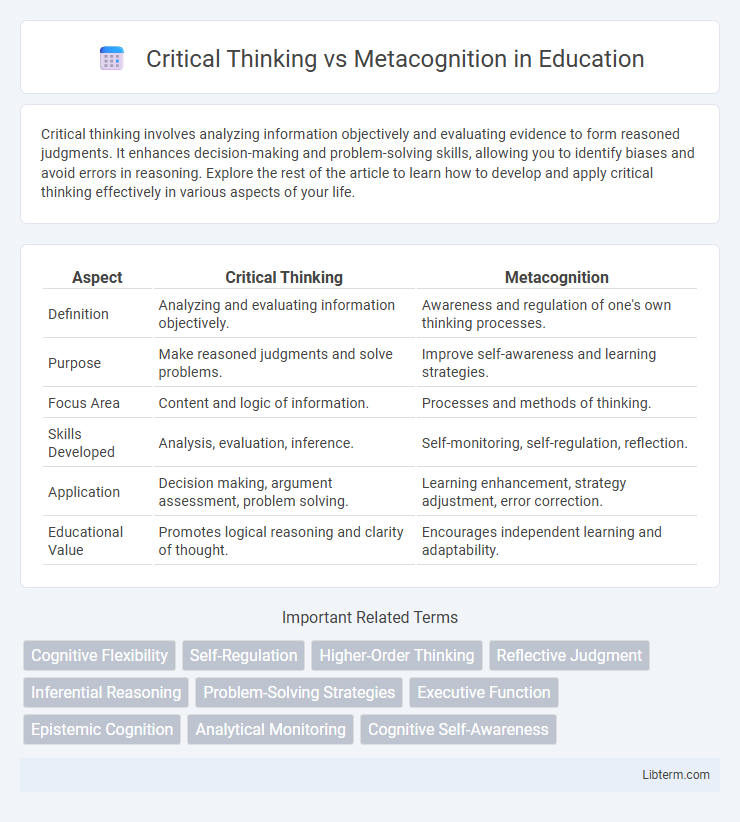Critical thinking involves analyzing information objectively and evaluating evidence to form reasoned judgments. It enhances decision-making and problem-solving skills, allowing you to identify biases and avoid errors in reasoning. Explore the rest of the article to learn how to develop and apply critical thinking effectively in various aspects of your life.
Table of Comparison
| Aspect | Critical Thinking | Metacognition |
|---|---|---|
| Definition | Analyzing and evaluating information objectively. | Awareness and regulation of one's own thinking processes. |
| Purpose | Make reasoned judgments and solve problems. | Improve self-awareness and learning strategies. |
| Focus Area | Content and logic of information. | Processes and methods of thinking. |
| Skills Developed | Analysis, evaluation, inference. | Self-monitoring, self-regulation, reflection. |
| Application | Decision making, argument assessment, problem solving. | Learning enhancement, strategy adjustment, error correction. |
| Educational Value | Promotes logical reasoning and clarity of thought. | Encourages independent learning and adaptability. |
Understanding Critical Thinking: A Foundation
Critical thinking involves analyzing information objectively to make reasoned judgments, emphasizing skills such as evaluation, interpretation, and inference. It serves as a foundational cognitive process that enables problem-solving and decision-making across various contexts. Understanding critical thinking provides the basis for developing metacognition, which involves reflecting on and regulating one's own thinking processes.
Defining Metacognition: Thinking About Thinking
Metacognition involves the awareness and regulation of one's own cognitive processes, enabling individuals to plan, monitor, and evaluate their thinking strategies effectively. It encompasses self-reflection on how knowledge is acquired, understood, and applied, enhancing problem-solving and learning outcomes. Distinct from critical thinking, which focuses on evaluating information and arguments, metacognition centers on the internal assessment of one's mental activities to optimize cognitive performance.
Key Differences Between Critical Thinking and Metacognition
Critical thinking involves analyzing and evaluating information to make reasoned judgments, while metacognition focuses on awareness and regulation of one's own cognitive processes. Critical thinking emphasizes external problem-solving and logical reasoning, whereas metacognition centers on self-reflection about thinking strategies and learning methods. Key differences lie in critical thinking's output-oriented nature versus metacognition's process-oriented monitoring and control of cognition.
The Role of Critical Thinking in Problem Solving
Critical thinking plays a crucial role in problem solving by enabling individuals to analyze information objectively, evaluate evidence, and identify logical connections among ideas. It involves questioning assumptions, recognizing biases, and considering alternative solutions to reach well-reasoned conclusions. This cognitive skill enhances decision-making efficiency and accuracy, making it essential in complex and dynamic problem-solving scenarios.
Metacognitive Strategies for Self-Regulation
Metacognitive strategies for self-regulation involve planning, monitoring, and evaluating one's own cognitive processes to enhance learning and problem-solving effectiveness. Techniques such as self-questioning, goal-setting, and reflective journaling enable individuals to recognize knowledge gaps and adjust strategies accordingly. These approaches foster greater awareness of thinking patterns, improving the ability to regulate attention, motivation, and cognitive resources during complex tasks.
How Critical Thinking and Metacognition Interact
Critical thinking and metacognition closely interact by enabling individuals to evaluate their thought processes and improve decision-making quality. Critical thinking involves analyzing and assessing information logically, while metacognition refers to awareness and regulation of one's cognitive strategies. Together, they foster deeper understanding and adaptive learning by encouraging reflection on reasoning patterns and cognitive biases.
Benefits of Developing Critical Thinking Skills
Developing critical thinking skills enhances decision-making by fostering logical analysis and evaluating evidence accurately, leading to more informed and effective solutions. It improves problem-solving abilities by encouraging a systematic approach to identifying biases, assumptions, and alternative perspectives. Mastering critical thinking also boosts communication skills, allowing individuals to articulate ideas clearly and argue persuasively in both academic and professional settings.
Enhancing Learning Through Metacognitive Awareness
Metacognitive awareness significantly enhances learning by enabling individuals to monitor and regulate their cognitive processes, leading to improved problem-solving and decision-making skills. While critical thinking involves analyzing and evaluating information, metacognition focuses on understanding one's own thinking patterns to optimize learning strategies. Developing metacognitive skills fosters self-reflection and adaptability, essential for mastering complex subjects and achieving academic success.
Practical Tips to Improve Both Critical Thinking and Metacognition
Enhance critical thinking by regularly questioning assumptions, analyzing evidence, and engaging in reflective discussions to deepen understanding. Boost metacognition through self-monitoring by tracking problem-solving strategies and evaluating outcomes to adjust thinking processes effectively. Integrate journaling practices that document thought patterns, helping to identify biases and improve both critical thinking and metacognitive skills over time.
Critical Thinking vs Metacognition: Which Is More Important?
Critical thinking and metacognition are both essential cognitive skills that contribute to effective problem-solving and decision-making. Critical thinking involves analyzing, evaluating, and synthesizing information logically, while metacognition refers to the awareness and regulation of one's own thought processes. Prioritizing metacognition can enhance critical thinking by enabling individuals to monitor, adjust, and improve their reasoning strategies, making metacognition foundational for developing advanced critical thinking abilities.
Critical Thinking Infographic

 libterm.com
libterm.com